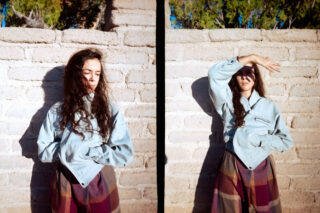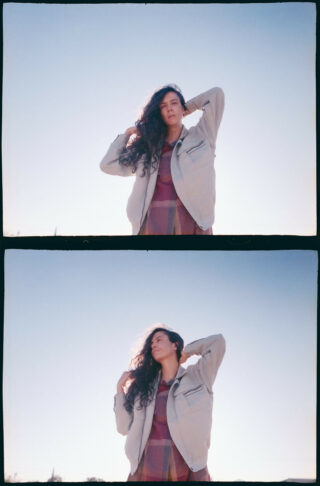Karima Walker: No listener left behind
Between sleep and wake, folk and drone, with an artist who's really not a morning person

Between sleep and wake, folk and drone, with an artist who's really not a morning person
Karima Walker is not a morning person. She admits this to me at 9am Arizona time, squinting into a webcam with breakfast coffee steaming at her side and early light streaming into the room behind her. Dusk, meanwhile, encroaches around me, seven hours and five thousand miles east. “I love it when I’m up early,” she starts to explain from her Tucson studio space, before correcting herself: “Actually, I love it when it’s early and I’m already awake. But I do not like waking – waking is a regular struggle for me. I could probably sleep for days if I didn’t have anything I needed to do. My natural rhythm is to stay up late and wake up late, even though I really wish I could be there for morning.”
Perhaps, then, crack of dawn isn’t the ideal time to be talking to Walker, whose own comfort zone – not to mention that of her new album of delicate folk songs intertwined with fragile, burbling tape loops – seems far more rooted in the small hours. Then again, maybe it is: after all, said new record evokes that woozy period of coming round after deep sleep, not yet fully alert but nonetheless hazily aware of one’s surroundings, with its title, Waking The Dreaming Body, signposting that evocation directly.
Across its 40 minutes, it addresses that headspace both head on (in its quietly pastoral title track, Walker, breathy and quiet as if only just stirring, sings that “it seems like every morning starts the same way”) and also more obliquely: across large swathes of drone and field recordings, the strange internal logic of the hypnagogic brain is transferred into peaceful abstract sounds that, when assembled, feel like the aural equivalent of huge Rothko canvases: simultaneously edgeless and depthless and still, their meticulously-planned giant form residing beyond the realms of waking intelligibility, but only just. At their most impressive, as on a 13-minute album centrepiece that swoops elegantly from beatific synth surges into dense thickets of reed sounds and out into distant piano and environmental recordings of howling wind, the pieces are restorative and calming, sedate but teeming with life.
However, it’s when Walker combines these two forms – swaddling the warm orthodoxy of American folk music in noise and ambient texture, or using non-standard production techniques to subvert otherwise standard songs – that her music is at its most compelling. It’s an approach she first acknowledged while at college in the Midwest around the time of that region’s mid-noughties boom in what was initially called “alt-country”, essentially a retooling of traditional folk and country music with post-rock and experimental approaches. Walker recalls the excitement she felt after hearing Wilco’s A Ghost Is Born while in school, (in)famous for its penultimate migraine-mimicking epic drone piece ‘Less Than You Think’, and talks admiringly of the skewed attitudes adopted by records from around the same time like Master And Everyone by Bonnie “Prince” Billy and Jolie Holland’s Catalpa. “They were the people reinterpreting that tradition, but their trajectory away from it made a lot of sense to me,” she recalls.
It’s a trajectory that Walker has followed too. Where some musicians rely on strict compartmentalising of multiple styles, Walker’s preference is for the combinatorial approach. “The model of artists who will put all the lyrical songs on one side and then the instrumental pieces separate is something I like,” she begins, explaining the conception of her album, “but I wanted these two worlds or genres to get an equal amount of attention.
“I think that depending on what genre you’re responding to, or what genre representative you’re in conversation with, certain styles get downplayed or featured,” she continues. “Like, from a more lyric-based standpoint, an instrumental song can feel like negative space, or it can feel like something’s missing, which makes sense to me: I’m fascinated by the ways that lyrics and melodies ground us in really helpful ways, and in ways that are really powerful and poignant. But I’m also interested in why our ear then interprets, through the lack of that, new territory or a negative space that frames the lyric-based songs. So in putting them together I wanted to keep some of that tension. I wanted to have the push and pull of where that tension goes when we move from something that feels more definite and structured into a place that feels maybe more dreamlike.”

Occupying the liminal space between two opposing phenomena without diluting the essence or veracity of either seems to be a sort of superpower of Walker’s, whether it’s that space between waking and sleeping or between familiar song and peculiar drone, between the conscious and subconscious or the structured and the stumbled-upon. But that occupation is not borne of striking skilful compromise, like a seasoned centrist politician, but instead comes from sensitive, empathetic juxtaposition, and welcoming difference, contrast and diversity.
That feels timely: five days before I speak to Walker, while listening to Waking The Dreaming Body and thinking about what to talk to her about, extremist supporters of Donald Trump stormed the US Capitol in perhaps the most shocking demonstration of the political divisions that the deranged president had stoked while in office. Then, after a night glued to CNN, I returned to her album and, on re-listening, couldn’t help but hear Walker’s embrace of in-betweenness as a super-subtle solution suggestion for America’s discord, a demonstration of how it may be possible for the spaces between the worlds of old American traditionalism and potentially discomforting progressiveness to be hospitable to all-comers, instead of zones that must be fought over and recaptured.
I acknowledge to Walker that the metaphor is a stretch, and that I’d be amazed if the intent of her latest record were some sort of political mediation, and she agrees on both counts. But she is interested in the parallels, and perhaps in the hope and comfort, if nothing more pragmatic, that might be sought from viewing global problems through such an alternative prism, comparing them to how she performs her material: “With the lyric and more melodic songs, they’re easy to grab onto, and they make more sense as a single or as something that’s going to draw people in,” she remembers of pre-COVID gigs. “So I felt really aware of what songs could refocus and recentre the malleable attention that an audience is generously bringing to a show, and would try and find the places where I might lose people and where I might draw people in, where I could ground us, and then where I could appropriately push into more dissonant spaces that were maybe harder to listen to: where’s the threshold where I lose people, and who’s willing to come with me?
“Once I find that, we’ll reground together in something that feels comforting or beautiful, and then we’ll go back out, and it feels like this elastic exercise,” she explains. “The reason I talk about that, though, is because there are these questions of hospitality and otherness that I’ve been thinking about – when do people decide that they want to walk away, and where do they remain curious? What can I plant in the noisy places of my show to draw people out in ways that they wouldn’t have expected?”
She then tells a story of playing in a fairly sketchy-sounding rural bar in Oregon (Confederate flags flying, a rodeo happening in the background, cowboys propping up the bar) and using her no-listener-left-behind approach to win over her audience. “And I was like, wow, okay, so it works. It works to find this middle ground and still keep the tension of these differences. And that’s something I will probably keep exploring, because I don’t know if these dualities can always be reconciled in a clean way. But they exist in the same world, so there is, and can be, a way in which they cohabitate…”
To be clear, Walker is still talking about musical performance, even if the applications elsewhere are beautifully apparent. But just as she’s sounding at her most hopeful and utopian, she checks herself: “At the same time, there is some serious shit happening that I don’t even totally know how to process, so I’m afraid of suggesting there would be a direct application of my music to the current political situation. I don’t feel at all equipped to do that. But I do think, though, that these political questions of otherness are all about dual coexisting worlds, and that is absolutely a question I come back to all the time.”
There is a school of thought that characterises art as an act of reduction. It suggests that Michelangelo’s finished statue of David always existed within the block of stone in front of him, and his creativity lay in the removal of extraneous material until David appeared. Another, by contrast, sees it as an additive process, where the art lies in the combining of distinct notes or colours or words in a unique way. Walker’s approach, perhaps unsurprisingly, appears to lie somewhere in between those two schools, on the one hand whittling away at songs until elegantly succinct folk hymnals emerge, and on the other enmeshing those songs around burble and hiss, drone and dream, to make something fresh, reframed and reimagined. It’s a fragile union, at any time of the day.
Photography by Holly Hall